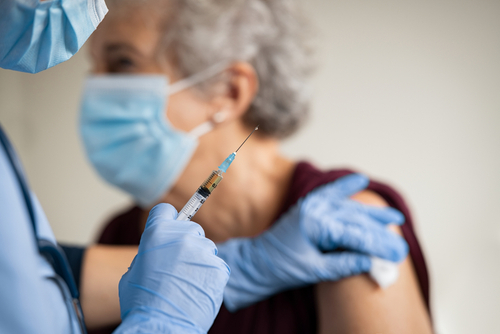First-dose ChAdOx1 and BNT162b2 COVID-19 vaccines and thrombocytopenic, thromboembolic and hemorrhagic events in Scotland
25 June 2021

Overview
Research by Scotland’s Early Pandemic Evaluation and Enhanced Surveillance of COVID-19 (EAVE II) team has played a significant role in the study of COVID-19 vaccine effectiveness and side effects. It followed on from an earlier study, involving many of the same team, into vaccine effectiveness which, alongside the RECOVERY trial, won the HDR UK Impact of the Year Award.
Challenge
As the Oxford-AstraZeneca vaccine was rolled out across the UK and Europe, concerns were raised that it could be linked with blood clots. By 21 April, 2021 some 209 instances of adverse blood events had been reported to the UK’s Medicines and Healthcare products Regulatory Agency (MHRA).
Some countries were stopping or restricting use of the vaccine.
There was an urgent need for research in order to protect public health and to provide evidence to guide the future of the vaccination programme. As the programme was fundamental in combatting the pandemic, and needed to progress at speed, the research needed to be comprehensive, fast and reliable.
Solution
The EAVE II study team led by Professor Aziz Sheikh OBE, Director of the University of Edinburgh’s Usher Institute, set out to meet this need. The EAVE II team uses routinely collected patient data to track the pandemic across Scotland in near real time. Their study covered 2.53 million people across Scotland who had received first doses of the Oxford-AstraZeneca and the Pfizer-BioNTech vaccines.
It was the first real-world study identifying all vaccinated people in a national population and assessing COVID-19 vaccine-related thrombocytopenic, venous or arterial thromboembolic and hemorrhagic adverse events.
Impact and outcomes
The research (published in Nature Medicine) found a very small increase in the risk of ITP (a low platelet count in the blood), and a possible small increase in clotting and bleeding events following the Oxford-AstraZeneca vaccine. This was equivalent to around one in 100,000 doses. Previous work indicated that the chances of these events were higher from contracting COVID-19.
No increase in risk of any of these outcomes of interest was associated with the Pfizer-BioNTech vaccine.
The research allowed policymakers to make evidence-based decisions on their response – whether this involved offering patient guidance, identifying at-risk groups or introducing restrictions on the use of the Oxford-AstraZeneca vaccine.
It also provided reassurance that an alternative was available for patients deemed to be at risk.
Lessons learned
The research again demonstrated the value of EAVE II (supported by HDR UK though the BREATHE Hub and part of the UK-wide Data and Connectivity programme) in using patient data to generate the large-scale research that is essential in responding to the pandemic.
With results based on 57.5% of the Scottish population (1.71 million people had the Oxford-AstraZeneca vaccine and 0.82 million the Pfizer-BioNTech vaccine) it is highly generalisable across countries that use these vaccines and have prioritised high-risk populations.
Contact
Prof. Sheikh can be contacted at aziz.sheikh@ed.ac.uk



